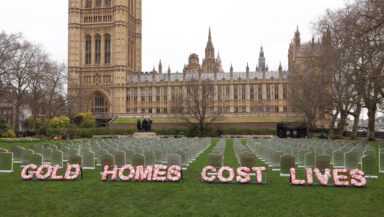Welcome to Fairbourne, the Welsh village on the frontline of climate change in the UK. Watch the video above to discover how the residents may lose their village as a result of the climate crisis.
Fairbourne is an exceptional story, but in one way or another, we’re all being affected by this climate emergency: from intensified summer heatwaves, to flooding and wildfires.
Flooding
2020 has already been a horrendous year for flooding, with large swathes of Shropshire and Yorkshire recently affected.
Long, wetter winters are consistent with what climate scientists would expect from the UK’s changing climate. It’s only set to get worse.
And as a recent Greenpeace Unearthed investigation found, thousands of new homes are planned to be built in high risk flood zones, just storing up problems for the future.
Heatwaves
For some parts of the UK, the summer heatwaves of 2019 may have been welcome, with long balmy days uncharacteristic of a British summer.
But in southeast England – particularly in cities – the heat reached unprecedented levels, with a record-breaking 38.7ºC in Cambridge in July.
Cities came to a standstill, hospitals were overwhelmed. Across England, the two 2019 heatwaves – one at the end of July and one at the end of August – led to at least 900 extra deaths, according to Public Health England.
Wildfires
2019 saw more UK wildfires than any other year on record – from Arthur’s Seat in Edinburgh to the Thousand Acre Wood (yes it’s real!) in East Sussex.
Longer dry spells caused by climate change are turning our lands into a tinderbox, destroying habitats, polluting the local environment, and forcing people to evacuate their homes.
So what will the government do about it? It needs to reduce the UK’s carbon emissions by investing in renewable energy, improving energy efficiency in homes, and improving farming practices. Greenpeace has drawn up a manifesto to match the scale of the climate crisis that reveals how this can be done.



